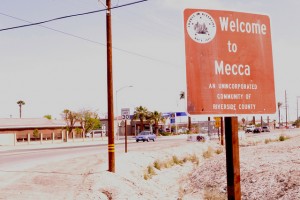

Former Desert Mirage High School and USC doctoral student Christian Paiz spent this summer exploring the history of the Eastern Coachella Valley with local students, stimulating and facilitating discussions with the hope of inspiring change in his hometown. PHOTO: Alejandra Alarcon/Coachella Unincorporated
By Aurora Saldivar,
Coachella Unincorporated
MECCA, Calif. – University of Southern California doctoral student Christian Paiz spent this summer exploring the history of the Eastern Coachella Valley with local students, stimulating and facilitating discussions with the hope of inspiring change in his hometown.
“You see all these fields and then there are these resorts, this huge social marginalization. You start to ask the question, why is this like this, and who planned these cities,” says Paiz, a former teacher at Desert Mirage High School. “Growing up in Thermal, Palm Desert was far away and for some reason Mexicali was not.”
Fortunately Paiz had positive role models in his elementary and high school teachers who encouraged his educational pursuits.
“A lot of intellectuals write about the problem, we need to start writing about the work. Often people working in the fields are blamed for the poverty it creates,” says Paiz, 29, whose studies primarily focus on California farm workers and social movements. “They are not the original architects.”
Lindsay Gutierrez, 21, a graduate of Desert Mirage High School, decided to attend the lecture series for academic reasons.
“For my senior thesis, I will be focusing on post-war Coachella through the lens of Chicana feminist literature, and so I knew these lectures would be insightful,” says Gutierrez, a senior at Scripps College in Claremont. “Besides, Mr. Paiz was one of my high school teachers, and I knew of his inspirational teaching skills and his ongoing effort to educate and help our community. I knew I had to attend his lecture series.”
Gutierrez has already seen benefits from Paiz’s lecture series beyond academics.
“I’ve begun to use this new knowledge by talking to my relatives about it and helping them understand things like why we have a racially and socio-economically segregated Coachella Valley.”
Paiz initially created this program out of his desire to reconnect with former students such as Gutierrez. In doing so, he was able to teach them about the area’s history and introduce them to those working to promote health and improvement within the community. He met weekly with about 70 students over six weeks at the Mecca Public Library. Many community groups, local nonprofits, and other Eastern Coachella Valley professionals served as guest speakers.
“Many times we don’t know why certain things are the way they are, and we may take things as fixed, as simply situations that we cannot change,” says Gutierrez. “However, by knowing the history of our community, we can better understand the current conditions of this place and question these in hope of creating positive change.”
Paiz strongly believes that this type of thinking can lead to change.
“Intellectualism is very important for people in the Coachella Valley. We need to approach and see ourselves as intellectual beings; beings that can speak and express themselves. Anyone and everyone should engage in rigorous thinking,” he says. “We need people to knock on doors. Changes in the world take place in everyday experiences and young people need to be involved.”
Paiz emphasizes that the Coachella Valley does not exist by itself. “People know when they have enough power to make systematic changes, people know that it’s immigrants and people of color that are hurt by policy. The power to make these changes needs to be built,” he says.
His biggest hope is that his students recognize they have this power.
“Their activism and involvement are important for all of us. Their energy and enthusiasm is the power,” says Paiz.
Paiz advises students to “follow your heart, feel fulfilled, and direct your work toward the public good.”
Despite each student’s unique professional pursuits, Paiz believes it’s important for everyone to work together toward change.
“It’s important for students to understand we need everyone, you can do this anywhere, we are all struggling together,” he says. “It’s important to know that we are struggling but also that we are surviving.”